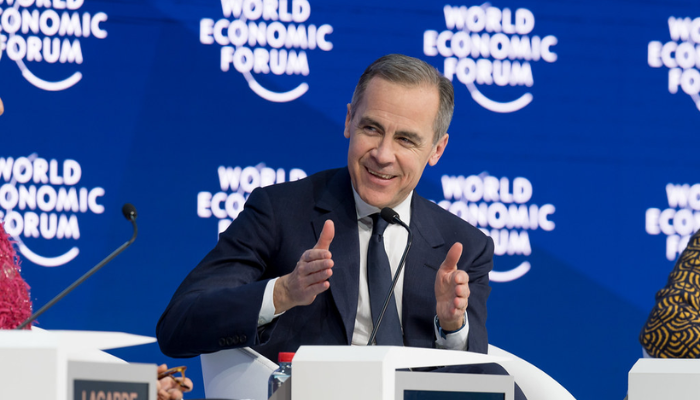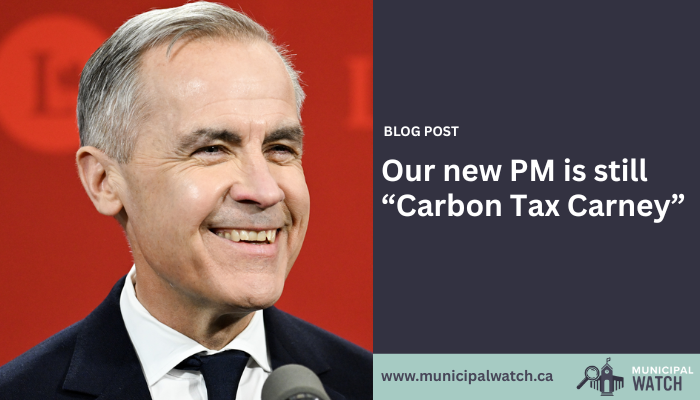As a globalist – now arguably one of the most powerful globalists in the world – Mark Carney has long been a practitioner of the principle of “think globally, act globally” and he has the resume to prove it. For years now, a big part of the globalist agenda that Carney has been pushing, and implementing, has been masquerading under the brand name “Net Zero by 2050.”
WHAT IS “NET ZERO BY 2050”?
In short, Net Zero means either emitting no greenhouse gases (GHGs) or offsetting whatever is emitted through measures such as buying carbon credits or investing in carbon capture technology. The goal of achieving Net Zero by the year 2050 is tied to the Paris Agreement’s aim of limiting average global temperature increases to 1.5 degrees Celsius.
Many Canadians, including those elected to municipal councils across the country, may find this appealing, but it is a recipe for disaster. It represents a war on fossil fuels, mining & related resource extraction, and industrial development in general – presenting particular doom for a country like ours whose chief exports are fossil fuels and raw materials.
It is also a ludicrous goal because it would be unimaginably expensive. Few economists are willing or brave enough to estimate the cost of Net Zero by 2050 for Canada but those who dare to attempt an estimate say that we are talking about $2 trillion. Yes, that word is TRILLION. That is more than our nation’s entire Gross Domestic Product!
Net Zero is essentially an end to economic growth and the rapid expansion of an already growing trend of poverty for Canadians.
Terrible economic impact? Immense personal hardship? Yes. But the end game for the green left and the globalists (like our new PM) who deliver their agenda is even more insidious.
At the heart of this Net Zero movement is a desire to fundamentally change our economy and way of life. Its proponents are looking for a complete (and devastatingly bad) transition from the economy that has made Canada the great and prosperous nation that it is.
There is not a country in the world that hasn’t heard of Net Zero and there is scarcely an economy in the G-7 or even G-20 that that hasn’t signed on to this self-defeating plan. But what about those politicians in the burgs and shires across the globe who have some real power at the local level? Have they been “thinking globally” about Net Zero and “acting locally,” of their own volition?
No, our local municipalities have been behaving like automatons, taking their marching orders from various players (think the World Economic Forum, the United Nations, and equivalent bodies) who are not remotely connected, let alone accountable, to real voters and citizens.
So, how does PM Mark Carney fit into this Net Zero scheme?
Mark Carney is a strong and vocal supporter of achieving Net Zero by 2050. Indeed, as the former UN Special Envoy on Climate Action and Finance, he has led the discussion advocating for aligning financial systems and economies with Net Zero targets.
In his book Value(s): Building a Better World for All, published in 2021, Mark Carney argued for nothing less than a fundamental transformation of the global economy, in which the Net Zero by 2050 agenda is key.
In the book, Carney contends that, in order to meet the 2050 Net Zero target, approximately 80 percent of known fossil fuel reserves must remain in the ground — a figure that underscores the scale of the shift he envisions away from fossil fuel dependency. He acknowledges the economic challenges, particularly for countries like Canada with significant oil and gas sectors, but he frames the transition as inevitable and beneficial in the long term, creating jobs and growth in new industries while phasing out unsustainable ones.
While he has proposed adjustments to policies like Canada’s carbon tax (less direct consumer tax, more industrial), Carney’s broader climate strategy remains focused on achieving Net Zero by 2050 through private finance, incentives, and comprehensive economic restructuring policies.
As our new PM’s agenda unfolds on a rather unsuspecting public, expect to hear less about “carbon taxes” in the coming years and a lot more about “Net Zero,” already a much-loved policy of the former Trudeau Liberals, the Doug Ford PCs, the BC NDP, and even usually sensible governments like those in Alberta and Saskatchewan.
And don’t forget the Climate Action Plans / Climate Emergency Declarations adopted by just about every municipality in Canada. These plans all ultimately, and usually, explicitly point to “Net Zero” as their solution to their so-called climate emergencies.
The story of who is funding the “local action” of the “think globally, act locally” Net Zero campaign has yet to be told. Stay tuned.









